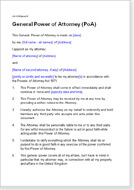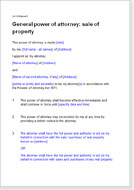Introduction
These documents create an ordinary power of attorney (abbreviated to PoA). They are suitable to use where you grant powers for a short and specified period of time. Each document records the terms of delegation - legal authority for someone else to take decisions on your behalf.
As the giver you become the donor of the power and the receiver becomes your attorney. The actions that your attorney may take on your behalf can be as general or specific as you like and may relate to one part or all of your affairs.
You can appoint anyone to be your attorney such as a family member of friend. It doesn't have to be a lawyer. The word 'attorney' simply means someone who can take decisions for you. In the past, you would delegate decisions about legal matters to your lawyer, who would become your 'attorney at law'.
With these templates, you have complete flexibility as to who to nominate as your attorney, the powers that you delegate and how they should be used, and the time period during which the powers last. You can also specify the matters you don’t want the attorney to have power over.
Using a PoA document
It is a good idea to discuss the extent of the power with your attorney in advance. Doing so will give them the opportunity to ask questions about your instructions and let you make clear exactly what you would like them to do. If you do, make sure what you have agreed is included in the document.
Requirements
In order for your PoA document to be valid, these conditions must be met:
- you must be over 18 years of age and have mental capacity
- the person to be appointed as your attorney must also be over 18 and not be an undischarged or interim bankrupt
You can only grant the power of attorney to do things that you already have the right and capacity to do yourself.
No requirement for registration
You do not have to register a general power of attorney with anyone or any organisation. A document has binding effect once signed (or otherwise, if you say so in the document).It relies on law contained in the Powers of Attorney Act 1971.
Examples of use
You are abroad but need someone to manage your financial and legal affairs at home (such as buying or selling property).
You want to allow someone to perform a specific task on your behalf on a regular basis (such paying your bills in your name from your bank account each month or collecting a pension).
You want to allow someone with greater knowledge of a subject to make decisions on your behalf.
Difference between an ordinary power of attorney and a Lasting Power of Attorney
You should not confuse a general power of attorney with a Lasting Power of Attorney (abbreviated to LPA) or an Enduring Power of Attorney (abbreviated to EPA).
An LPA is made in anticipation of a person losing mental capacity and becoming permanently unable to handle their own affairs.
Since October 2007, LPAs have replaced EPAs. No new EPA can be created and it is recommended that existing ones are replaced with LPAs.
Because a donor is unable to renounce an LPA once mental capacity has been lost, there are special rules for making an LPA that do not apply to ordinary power of attorney forms, such as having a 'certificate provider' witness the parties signing, and registration at the Office of the Public Guardian.
There are two types of LPA: one for Health and Welfare and the other for Property and Financial affairs. You can choose to make one or both. The reason that they are separate forms is so that you can nominate different attorneys for each subject.
Making the Lasting Powers of Attorney documents is a practical matter, much as making a Will is. They are not just for old age. You might not expect to lose mental capacity anytime soon, but accidents can happen and without these documents, providing the right care for the remainder of your life might be difficult. Simply being a family member (even a wife, husband or civil partner) does not confer automatic legal rights that could help you if you lose mental capacity and cannot make your own decisions.
You can read more about different types of power of attorney.
We also have a free online LPA service that allows you to make both types of lasting power of attorney forms.







